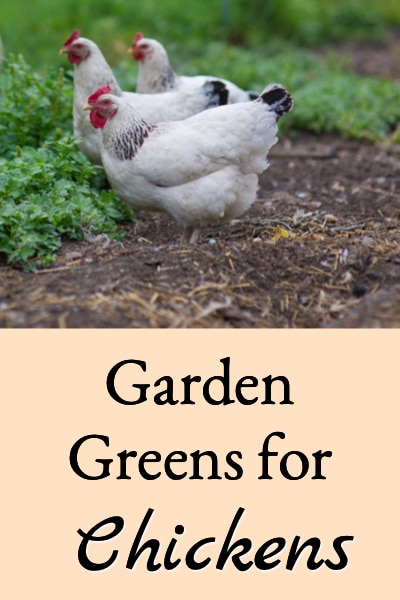
In the not-so-distant past, feeding the flock from the garden was taken for granted. But today, most chicken owners feed their flocks commercially mixed and bagged feed. These premixed and balanced rations are a fairly recent development, and prior to about 100 years ago, they didn’t exist. Back then, chickens lived off of what they could forage from the farmyard, and that typically included garden plants. Supplementing the flocks’ diet with garden greens was a centuries-old practice, and the greens that are good for them were well understood.
In our era, we may need to relearn which greens make good chicken food, but the good news is, they haven’t really changed. And, there are only a few garden plants that should not be fed to chickens or that should be fed in moderation.
BASICS GUIDELINES FOR FEEDING CHICKENS FROM THE GARDEN
In general, garden vegetables that we consider to be healthy for us to eat are also healthy for chickens to eat. But, if your chickens are accustomed to commercial feed, then at first it’s best to begin offering them garden greens later in the day after they’ve fulfilled their dietary requirements by eating the commercial mix.
Also, it’s a good idea to start introducing varied fodder from the garden a little at a time; it’s never good to make drastic changes in any livestock-feeding regimen. Up to about 20% of a chicken’s diet can be replaced with greens; however, most of their food should still come from a balanced ration to ensure they get sufficient protein and nutrients.
The recommendations below for feeding common garden plants to chickens are grouped by plant families because plants within the same families tend to share characteristics that make them more or less suitable as chicken fodder. That way, even if the specific plant you’re interested in feeding is not listed, you can begin to identify whether that plant might make good chicken food based on its family. For example, if you were considering feeding a plant that’s from the Solanaceae family, you might want to reconsider, since plants from that family are generally not good choices for feeding chickens.
Note that when sharing your garden excess with your chickens, you should consider bringing the plants to the chickens, rather than the chickens to the garden. A few chickens can demolish a garden in short order, and will reliably start on your most prized crop first.
GARDEN PLANTS THAT ARE GOOD FOR CHICKENS
Pumpkins, Squash, Zucchini, Cucumbers, Melons (the Cucurbitaceae family)
The vegetables from this family (which includes all of the summer squashes, winter squashes, cucumbers, cantaloupes, watermelons, and gourds) are all excellent sources of nutrition, hydration, and intestinal dewormer for your flock. And, pumpkins and winter squashes can be cured and stored so that they can be fed to the flock throughout the winter months (see How To Store Vegetables For Winter).
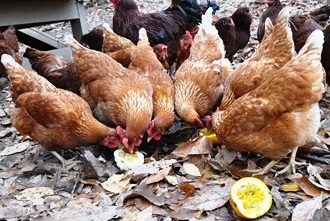
Chickens Eating Squash
Beans & Peas (the Leguminosae family)
Vegetables in the Leguminosae family rank second only to grains as our most important food source. As such, fresh green beans and peas are nutritious and fun treats for chickens, and the entire plant can be fed to them. However, uncooked dry beans should be avoided as they contain hemagglutinin, a toxin poisonous to chickens.
Corn (the Gramineae family)
Corn is the original “scratch” used to feed chickens on the farm, and it’s high in carbohydrates. But, it’s also low in protein and nutritional value, so it’s best to feed in moderation. The whole corncob with either fresh or dried kernels attached can be fed to chickens; whereas the plants themselves are better as additions to the compost pile (the entire plant is edible but the stringy leaves can become a problem in the crop of the birds).
Celery, Carrot, Fennel, Parsnip (the Umbelliferae family)
The Umbelliferae family includes common plants that have umbrella-shaped flowers, such as celery, carrot, fennel, and parsnip. The family is very large, and also includes herbs such as dill, parsley, and coriander. Chickens tend to love the plants from this family (both the tops and roots), and both the vegetable and herb varieties are good for them.
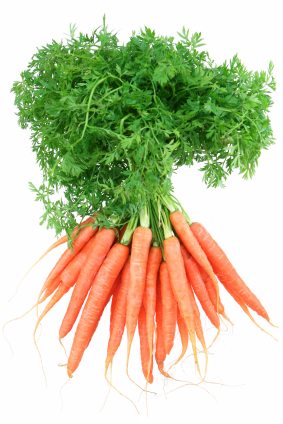
Carrots Are Good For Chickens
Lettuce, Endive, Jerusalem artichoke, Sunflower (the Compositae family)
This family of plants is often thought of as the salad family, but it also includes Jerusalem artichokes and sunflowers. All of these plants are nutritious and make great additions to chicken diets. Sunflowers can also be dried and saved to use for treats and promote exercise in the winter chicken coop.
GARDEN GREENS TO AVOID FEEDING TO CHICKENS
Potato, Tomato, Eggplant, Pepper (the Solanaceae family – also known as the Nightshade family)
You should always avoid feeding potatoes that have sprouted or been left in the sun because the skins might have developed solanine, which is mildly poisonous to people, but potentially very poisonous for chickens. If the potato skins have turned green, then you know to avoid feeding them.
The vines and immature fruit of tomato, eggplant, and pepper plants may also contain toxic quantities of solanine, and should not be fed to chickens. Since it’s difficult to tell how much solanine the members of the nightshade family might contain, we don’t feed any of this family of vegetables to our chickens.
Rhubarb (the Polygonaceae family)
Something else to avoid feeding your chickens is rhubarb, which contains high levels of oxalic acid. Oxalic acid can prevent calcium absorption, leading to bone issues, nutrient imbalance, and potential problems with eggshell quality. Rhubarb leaves are also toxic to humans (only the leaf stalks should be consumed by humans because they contain minimal quantities of oxalic acid).
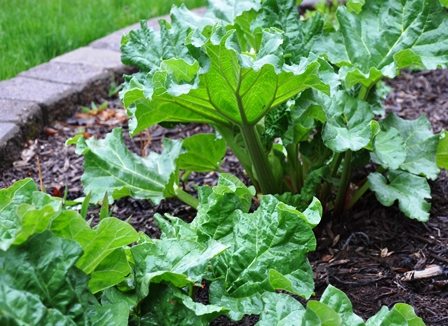
Rhubarb – Avoid Feeding to Chickens
Onion (the Amaryllidaceae family)
Onions contain a substance called thiosulphate, which can cause anemia in livestock and chickens. Onions can also affect the taste of the eggs, so feeding onions to chickens is not recommended.
GARDEN PLANTS TO FEED TO CHICKENS WITH CAUTION
Broccoli, Cabbage, Cauliflower, Kale, Turnips, Radish (the Brassicaceae family)
We all know that the members of the Brassica family are nutritional powerhouses for humans, and it’s generally no different for our feathered friends. However, these plants contain glucosinolates that can be toxic to livestock. These toxins are found in the greatest quantities in the seeds and young plants of these vegetables, and significant quantities of these must typically be eaten to cause problems.
So, feeding the mature plants (and not seeds) is generally considered safe for healthy chicken flocks. All of the brassicas can be fed raw, and many chicken keepers like to hang a head of cabbage or broccoli in the coop during winter to provide some entertainment and nutrition for their chickens.
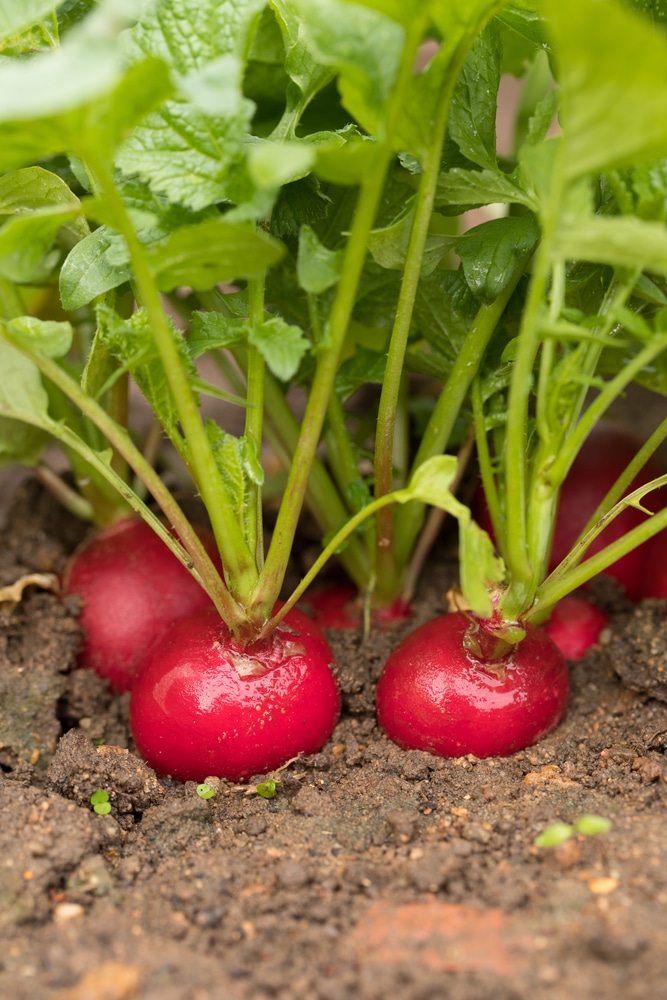
Mature Radishes – Ok for Chickens
Swiss Chard, Spinach, Beet (the Chenopodiaceae family)
This family of vegetables is also known for being very nutritious so occasionally feeding chickens leafy greens is a healthy treat. However, too much of some leafy greens can be a bad thing. Swiss chard, spinach, and beet greens all contain oxalic acid, which binds with calcium when eaten by the flock and can lead to calcium deficiency. So, it’s best to feed these greens in limited quantities. Beetroots, alternatively, are very nutritious and make great chicken fodder. Mangel beets, in particular, have been grown and used as chicken food for centuries (see Growing Mangel Beets for Chickens).
HEALTHY CHICKEN TREATS
With only a few exceptions, the greens and vegetables grown in our gardens are excellent fodder for chickens. Used in moderation, they are a nutritious diet addition and will enhance the health of your flock.
It’s no coincidence that the egg yolks from free-ranging backyard flocks are richer in color and tastier than grocery store eggs. The extra vitamins they get from the plants in their diets make for better eggs. So, be sure to include surplus greens and vegetables (of the appropriate types) from your garden in your flocks’ diet – both you and the chickens will benefit.
Leave a Reply